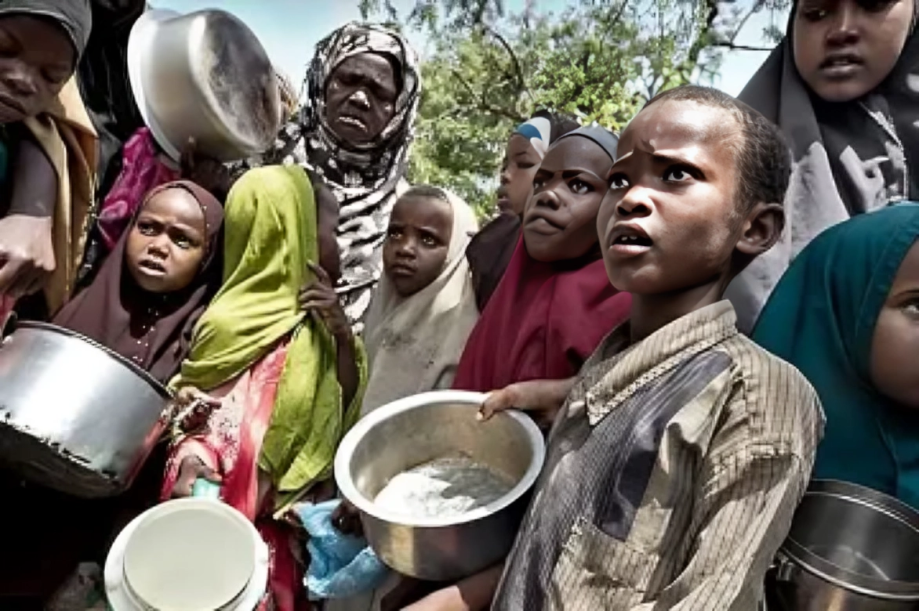By Gideon Amuah | Email- gideon.amuah@gmail.com
In 2024, more than 295 million people across 53 countries faced acute food insecurity — an increase of nearly 14 million from the previous year. As the world enters 2025, hunger is spreading faster than the solutions meant to stop it. From Sudan and South Sudan to Gaza and Somalia, the World Food Programme warns that funding cuts are forcing millions to the edge of starvation. This is not just a distant humanitarian crisis; it is a mirror reflecting the vulnerabilities of nations like Ghana, where food systems remain fragile and heavily dependent on external conditions.
Even though global hunger as a percentage of the population fell slightly from 8.5 to 8.2 percent, this improvement hides a cruel imbalance. Gains in Asia and Latin America mask worsening hunger in Africa, where more than 307 million people now face food insecurity — representing over 20 percent of the continent’s population. In parts of Sudan, famine is already official. In Gaza, international experts have declared widespread starvation. As donor fatigue deepens and aid budgets shrink, entire populations are slipping from hardship into hopelessness. The message for Ghana and its neighbors is clear: the era of depending on global food aid and imports for stability is fading fast.
The first global signal Ghana must heed is the collapse of food safety nets. As donor countries turn inward to manage their own economic challenges, aid pipelines are drying up. The World Food Programme has reduced coverage in several African countries by nearly 40 percent because of funding shortages. In the Democratic Republic of Congo, millions are at risk because assistance has been scaled down. The lesson is simple but urgent: nations that rely on external support for food resilience will find themselves unprotected when crises multiply. Ghana must strengthen its domestic safety nets, from buffer stock management to responsive subsidy systems, so that price shocks or bad harvests do not immediately translate into hunger.
The second signal comes from conflict and displacement. Wars disrupt planting, destroy infrastructure, and displace farmers breaking the chain that connects field to market to table. In places like Sudan, Yemen, and Gaza, fertile lands have turned into battlegrounds. But conflict’s impact travels farther than the frontlines. When war shuts down export routes or reduces global supply, prices surge everywhere, including Accra and Kumasi. Ghana, which imports most of its rice, wheat, and poultry, cannot remain insulated from such global volatility. The country must diversify its sources, strengthen local production, and build more resilient supply chains that can absorb shocks.
The third and perhaps most enduring challenge is climate change. From record-breaking droughts to devastating floods, extreme weather is eroding agricultural productivity across continents. Crops are failing, soil fertility is diminishing, and rainfall patterns are no longer predictable. In Africa, the combination of climate and population growth is tightening the squeeze on food supply. For Ghana, where over 60 percent of agriculture remains rain-fed, this is a ticking clock. Expanding irrigation, investing in drought-resistant seeds, and promoting climate-smart agriculture are no longer optional ,they are essential for survival.
But within this crisis lies opportunity. Around the world, nations are rethinking their food strategies, emphasizing local resilience over dependency. India, for example, has invested heavily in food storage and distribution infrastructure, reducing post-harvest losses. Kenya is scaling solar-powered cold-chain systems to preserve perishable produce. These models show that resilience is not beyond reach—it requires political will, strategic investment, and the mobilization of citizens who understand that food security is national security.
For Ghana, the task ahead is to combine policy vision with practical action. Food reserves must be rebuilt and managed transparently. Research institutions should work closely with farmers to improve yields through innovation and training. Agribusiness should be treated as a critical economic sector, not an afterthought. And every Ghanaian must recognize that protecting local food production is an act of patriotism.
The global food security landscape in 2025 tells a sobering story: when aid recedes, hunger surges. As humanitarian support shrinks and conflicts multiply, only nations that can feed themselves will remain stable. Ghana’s response must go beyond speeches and committees. It must be rooted in decisive investment, protection of farmland, and efficient market systems that link the farmer’s field to the family’s table. The future of food will belong to those who plan for it today.
Hunger knows no borders and neither should our determination to prevent it.


